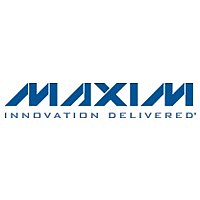MAX8845XETC+ Maxim Integrated Products, MAX8845XETC+ Datasheet - Page 10

MAX8845XETC+
Manufacturer Part Number
MAX8845XETC+
Description
IC BATT CHARGER CCCV 28V 12TQFN
Manufacturer
Maxim Integrated Products
Datasheet
1.MAX8845WETC.pdf
(19 pages)
Specifications of MAX8845XETC+
Function
Charge Management
Battery Type
Lithium-Ion (Li-Ion)
Voltage - Supply
0 V ~ 28 V
Operating Temperature
-40°C ~ 85°C
Mounting Type
Surface Mount
Package / Case
12-TQFN Exposed Pad
Lead Free Status / RoHS Status
Lead free / RoHS Compliant
28V Linear Li+ Battery Chargers with Battery
Detection and Overvoltage Protected Output
Connect a ceramic capacitor from BATT to GND for
proper stability. Use a 2.2µF ceramic capacitor for most
applications. Connect a 1µF ceramic capacitor from IN
to GND. A larger input capacitor can be used for high
charging current to reduce input voltage ripple.
Connect a 1µF ceramic capacitor from SAFEOUT to
GND. A larger bypass capacitor for SAFEOUT can be
used for optimum noise immunity. Ceramic capacitors
with X5R or X7R dielectric are highly recommended
due to their small size, low ESR, and small temperature
coefficients.
The MAX8845Z/MAX8845Y/MAX8845X/MAX8845W are
available in thermally enhanced Thin QFN packages
with exposed pads. Connect the exposed pad to a
large copper ground plane to provide a thermal contact
between the device and the circuit board for increased
power dissipation. The exposed pad transfers heat
away from the device, allowing the IC to charge the
battery with maximum current, while minimizing the
increase in die temperature.
The MAX8845Z/MAX8845Y/MAX8845X/MAX8845W
operate from well-regulated DC sources. The full charg-
ing input voltage range is 4.25V (4.4V for MAX8845W
only) to 7.5V (8V for MAX8845X only). The device can
withstand up to 28V on the input without damage to the
IC. If V
the internal overvoltage-protection circuitry disables
charging until the input falls below 7.5V (8V for
MAX8845X only). An appropriate power supply must
provide at least 4.25V at the desired peak charging
current and stay below 7V when unloaded.
Figure 3 shows the MAX8845Z as a Li+ battery charger
with an AC adapter. The MAX8845Z detects the presence
of an input supply and DETBET, resulting in POK pulled
low. Once POK is pulled low, the autobooting assistant
drives ABO high (MAX8845Z) and enables the power
10
______________________________________________________________________________________
IN
is greater than 7.5V (8V for MAX8845X only),
Typical Application Circuits
Thermal Considerations
Capacitor Selection
AC Adapter Application
DC Input Sources
supplies of the system to boot up. The MAX8845Z begins
charging the battery when EN is low or unconnected. By
monitoring CHG, the system can detect the top-off thresh-
old and terminate the charge through EN. The
MAX8845Z/MAX8845Y/MAX8845X/MAX8845W also pro-
vide an overvoltage-protected SAFEOUT to the system.
Figure 4 shows the MAX8845Z as an autoboot assistor
with the factory system interface connector. The
MAX8845Z detects the ABI input even though there is no
input voltage available and generates an ABO signal to
turn on power supplies to boot up the system. The con-
figuration in Figure 4 is used for system development,
testing, and calibrations in production or design stage.
The universal serial bus (USB) provides a high-speed
serial communication port as well as power for the
remote device. The MAX8845Z/MAX8845Y/MAX8845X/
MAX8845W can be configured to charge batteries at the
highest current possible from the host port. Figure 5
shows the MAX8845Z as a USB battery charger. To
make the circuit compatible with either 100mA or
500mA USB ports, the circuit initializes at 100mA charg-
ing current. The microprocessor then enumerates the
host to determine its current capability. If the host port is
capable, the charging current is increased to 450mA to
avoid exceeding the 500mA USB specification through
GPIO control. The MAX8845Z/MAX8845Y/MAX8845X/
MAX8845W also provide an overvoltage-protected
SAFEOUT to the system.
Place all bypass capacitors for IN, BATT, and
SAFEOUT as close as possible to the device. Connect
the battery to BATT as close as possible to the device
to provide accurate battery voltage sensing. Provide a
large copper ground plane to allow the exposed pad to
sink heat away from the device. Make all high-current
traces short and wide to minimize voltage drops. A
sample layout is available in the MAX8845Z Evaluation
Kit to speed designs.
Factory System Interface Connector Application
Recommended PCB Layout and Routing
USB-Powered Li-Ion Charger











